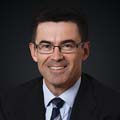

John Wylie AM
CHAIR
AUSTRALIAN SPORTS COMMISSION
This report is an occasion to reflect on the recently completed Olympic and Paralympic Games in Rio de Janeiro, in which Australia secured a top 10 place in the Olympics and a top 5 place in the Paralympics.
We congratulate and salute all of our athletes who represented Australia at the Rio Games. You did so with great distinction. The country is proud of your commitment, dedication and performance, and the manner in which you conducted yourselves.
While the overall medal outcome in the Olympic Games was less than the aspirations of the ASC and the Australian Olympic Committee (AOC), there were many positives. We reversed a 16 year trend since Sydney of medalling in a smaller number of sports, with medals in 12 sports compared to 11 in London. 55% of our athletes who finished in the top eight in their event were 24 years of age or younger, compared to 43% in Sydney and 46% in Beijing, auguring well for the future.
In the aftermath of the Games, the Board of the ASC has re-committed to the core principles of Australia’s Winning Edge 2012-2022 , the ASC’s 10-year plan for high performance sport introduced in 2012. The four key principles are: high aspirations for achievement; evidence-based funding decisions; sports owning their own high performance programs; and a strong emphasis on improved leadership and governance.
We are confident these principles serve the long term interests of sporting sector.
We will also use the experience of the past four years to seek to improve implementation of Australia’s Winning Edge in ways that will benefit the sector.
The ASC is equally committed to increasing community participation in sport, particularly among our children and youth. We have been pleased this year to see our flagship participation program Sporting Schools reach more than 4,300 schools in partnership with national sporting organisations (NSOs).
Innovations by the ASC this year included the release of our Integrity guidelines for directors and leaders of sporting organisations, which provides directors with comprehensive and practical guidance for the first time on anti-doping, sport science and medicine, illicit drugs, match-fixing, child protection and member protection – vital issues for maintaining trust and respect in the sporting sector.
We also staged our inaugural Athlete and Coaches Forum, giving Australia’s elite athletes and coaches the opportunity to share their experiences and enhance their leadership capabilities.
And we were delighted to see fruits of our efforts to improve female opportunity in sports, with improved elite and participation opportunities in women’s sport, better media exposure, some outstanding new commercial deals, and an increase in female representation at NSO board level from 27 per cent to 39 per cent across the top 23 NSOs.
Looking ahead, ASC priorities include:
- further institutional and governance reform in sport, with an emphasis on increased national integration and alignment
- increased funding for sport, including new non-government sources of funding
- further embedding sport in schools’ educational programs
- improved national coordination of sports infrastructure spending, and
- improved use of data and technology in sports.
Reforms like these are often hard to achieve but have profound long-term benefits. The ever-more competitive environment in world sport on display in Rio highlights the critical importance of further reform if Australia is to maintain its proud reputation and traditions as a leading sporting nation.
Many people make an important contribution to Australian sport and it is appropriate to acknowledge them in this report.
I and my Board thank the Minister for Health and Aged Care, Minister for Sport, the Hon. Sussan Ley MP, and her Department, for their continued effort and support for Australian sport over the past year. It is valuable and appreciated.
We acknowledge the leadership and achievements of the ASC’s outgoing CEO Simon Hollingsworth, who has led the Commission very capably and with considerable effect for the past five years. He has had a strong and positive impact on both the ASC and the sector.
We thank the many people who have contributed to our sector and helped the ASC and our sportsmen and women, including NSOs, the AOC, the Australian Paralympic Committee (APC), the Australian Commonwealth Games Association (ACGA), state institutes and state academies of sport (SIS/SAS), state departments of sport and recreation (SDSR), sponsors and business partners, coaches, support staff and families. Your continued partnership and support is critical to the success of Australian sport.
Finally, and certainly not least, we wish to also acknowledge and thank the talented and committed staff at the ASC for their passion and dedication. You are inspirational in so many ways, and make a great contribution to Australian sport.
John Wylie AM
ChairAustralian Sports Commission
30 September 2016